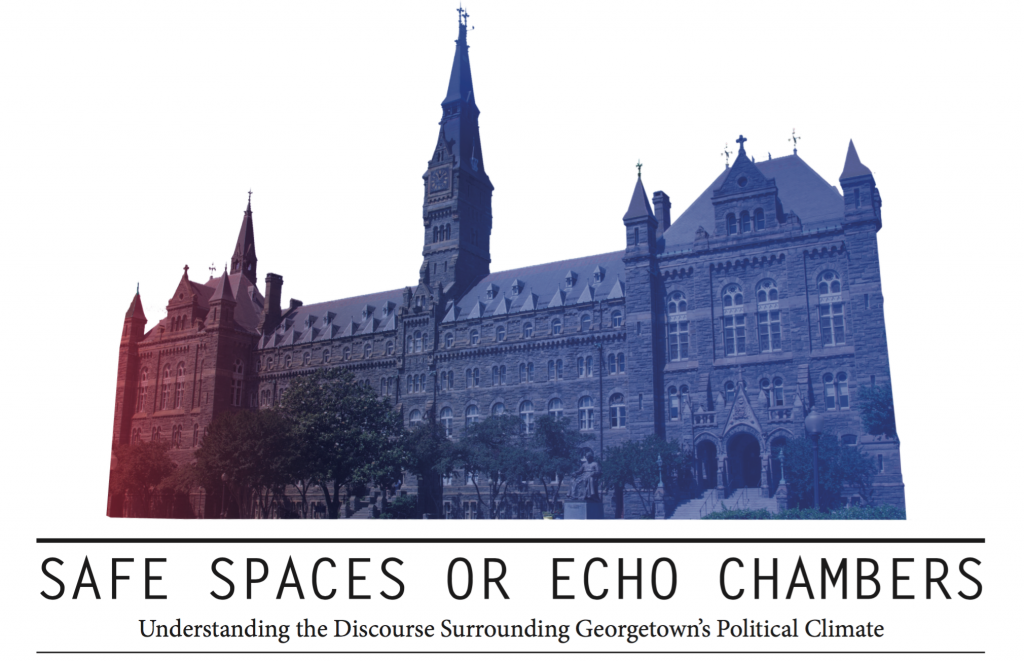 On April 16, 2015, at the invitation of the Georgetown University College Republicans (GUCR), Christina Hoff Sommers, a resident scholar at the American Enterprise Institute studying feminism and American culture, gave a lecture in a Healy Hall classroom titled, “What’s Right (and Badly Wrong) with Feminism.”
On April 16, 2015, at the invitation of the Georgetown University College Republicans (GUCR), Christina Hoff Sommers, a resident scholar at the American Enterprise Institute studying feminism and American culture, gave a lecture in a Healy Hall classroom titled, “What’s Right (and Badly Wrong) with Feminism.”
Some students filed along the back wall of the classroom and quietly held up multicolored signs that read, “Trigger Warning: Anti-Feminism,” and “I’m expressing my right to free speech; that doesn’t mean I’m infringing on hers.” Other students opened up a “safe space” in a Maguire Hall classroom to support sexual assault survivors who were emotionally triggered by Sommers’ talk.
According to GUCR President Amber Athey (COL ’16), what happened before the event on Facebook was more revealing about the protesters’ attitudes toward her organization. Two days before, commenters on GUCR’s Facebook page asked the GUCR why they had invited Sommers, and whether they would provide a trigger warning because Sommers had previously written articles criticizing the concept of rape culture.
A trigger warning would alert the lecture’s participants that Sommers’ lecture could contain potentially distressing material, in this case, for sexual assault survivors. Athey thought that sexual assault survivors were able to decide should able to decide whether they could attend GUCR’s event, so she did not think it required a trigger warning.
One of the groups protesting the event, H*yas for Choice, was especially outspoken against Dr. Sommers’ speech. “H*yas for Choice, as a group, had a discussion about our feelings on the university bringing Christina Hoff Sommers as a speaker, and [we] found some of her past work to be offensive,” Michaela Pepi-Lewis (COL ‘18), the vice-president of H*yas for Choice, said. “We did feel the need to make a note that we did not agree with the message that was being presented.”
Sophia Kleyman (COL ‘16), the president of H*yas for Choice, defended the trigger warnings that were presented by various campus groups before Sommers’ speech. “H*yas for Choice and other students that were involved protesting [the speech] wanted to create a safe space for students who did feel triggered by the event in a way that [GUCR] didn’t really account for and were reluctant to accommodate for,” she said.
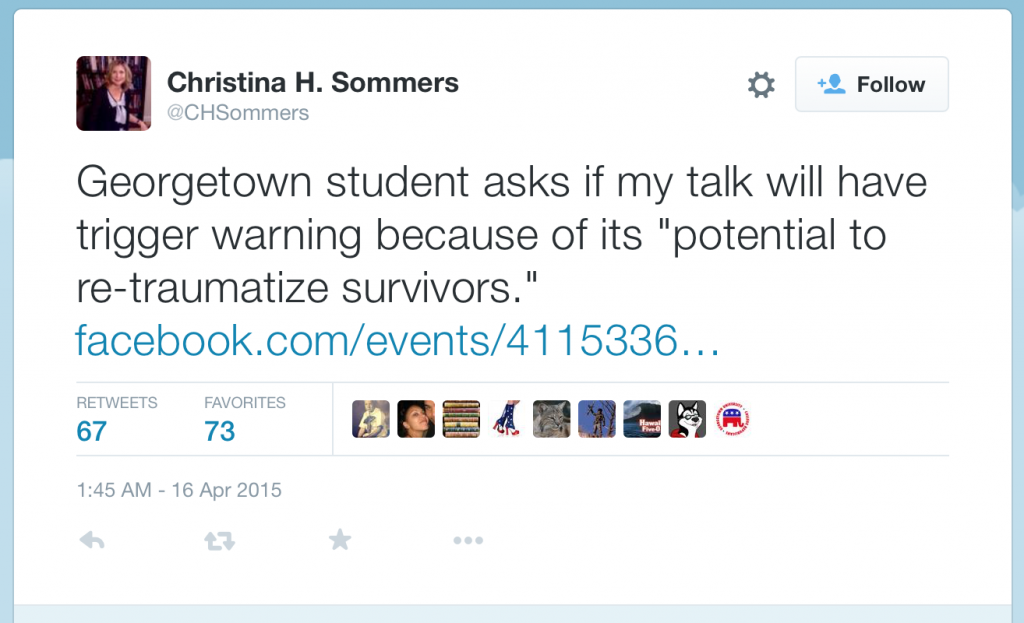
Sommers’ tweet from the morning of her lecture.
The morning before her lecture, Sommers tweeted, “Georgetown student asks if my talk will have trigger warning because of its “potential to re-traumatize survivors,’” with a link to the GUCR’ Facebook event on her Twitter account. According to Athey, Sommers’ Twitter followers proceeded to defend Sommers on the event page and engaged with students about whether the event should go on, and whether safe spaces and trigger warnings should be provided.
“The day before the event, I was on Facebook probably for the entire day just watching what was going on, and it was very stressful,” Athey said.
After the lecture, Athey took down the Facebook event page, because both sides were still arguing with each other. According to her, members of the GUCR board have been reluctant to invite another speaker like Sommers to campus, fearing the potential backlash.
“To be perfectly honest, what happened with Dr. Christina Hoff Sommers was exhausting,” she said. “We’ve had people concerned that they just don’t want to go through this again, because it’s so much work.”
The need for mental safety in college
In the past year, several national media outlets have published widely-shared op-eds about the “self-infantilization” of college students. Inside and outside the classroom, these authors say, college students are apparently demanding political correctness and protection from discussions and ideas that offend the identities they associate with.
On campus, trigger warnings have become a point of discussion, especially in light of the Sommers event. Their usage has called many to question how they can be compatible with the values of free speech that have been traditionally associated with the college experience.
Even President Obama has chimed in on the phenomenon. “I’ve heard I’ve of some college campuses where … [students] don’t want to read a book if it has language that is offensive to African Americans, or somehow sends a demeaning signal towards women,” he said to an audience at a high school in Iowa during a town hall last month. “And I’ve got to tell you … I don’t agree that you, when you become students at colleges, have to be coddled and protected from different points of views.”
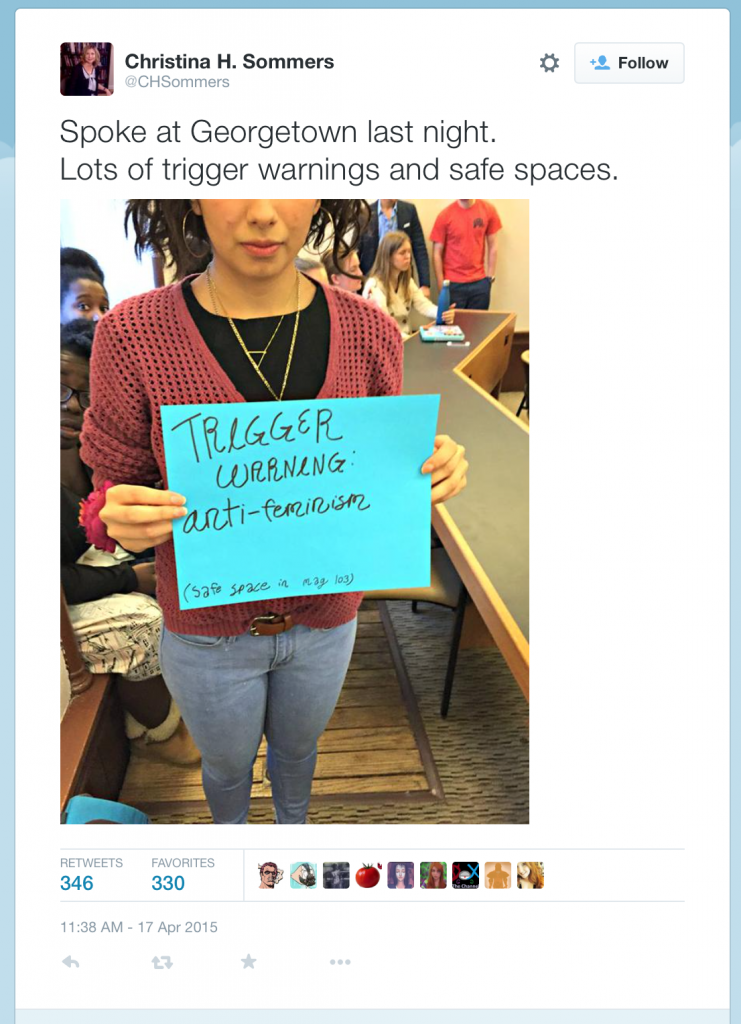
Sommers tweeted the above following her lecture, showing a student holding up a sign, “TRIGGER WARNING: ANTI-FEMINISM (Safe Space in Mag [Maguire] 103)” at the classroom in which GUCR hosted Sommers.
Too often, she says, trigger warnings like those can become political statements. “It’s not shielding yourself from potential trauma or harm,” she said. “It’s shielding yourself from a viewpoint that you don’t agree with, plain and simple.”
The principle of trigger warnings is also potentially in conflict with efforts to foster an environment of free speech on campus. “It’s making it seem like not only do you disagree with people, which is the point of having debates, but that somehow what someone else is saying is violent and that you need protection from this kind of speech,” said Michael Khan (COL ‘18), the president of Vita Saxa. “It makes it seem like it sets a dynamic where there’s tension, people are afraid to engage because you’re making this harsh accusation.”
Pepi-Lewis, however, defended the logic behind trigger warnings. “A common misconception is that leftist groups will request trigger warnings or some kind of safe space because they disagree with the message,” she said. “I think it’s important to point out the difference between offensive material and retraumatizing material…It’s not about being offended or disagreeing with the material, it’s about being retraumatized by it.”
Kleyman compared the situation to an event providing accommodations for students with disabilities. “This is a conversation that could be triggering to students,” Kleyman said. “In the same way that events need to be able to accommodate students with disabilities, they also need to accommodate for potential trigger situations.” Kleyman continued to explain that if the organization cannot or does not want to provide a safe space, then they should at least be receptive to other groups who are willing to provide one.
However, the vast majority of students who support of trigger warnings do not want to restrict free speech for the purpose of protecting people’s sensibilities. “I think the phenomenon of trigger warnings is exaggerated,” said Matthew Gregory (SFS ’17), president of the College Democrats. “People are saying that everyone is going to start using them, and every extra-curricular and every single class is going to use trigger warnings all over.”
Conversely, other students have argued that they may not be so necessary. “I think it’s pretty irresponsible to go to an event that you know is going to give you psychological damage, regardless of whether or not there’s a room to escape to,” Athey said.
Triggering dialogues in the classroom
Trigger warnings are also starting to find their way into the classroom dialogue. According to Jonathan Ladd, a professor in the Government department who teaches a class on politics and the media, Georgetown does an effective job of creating a conducive environment for free speech in the classroom.
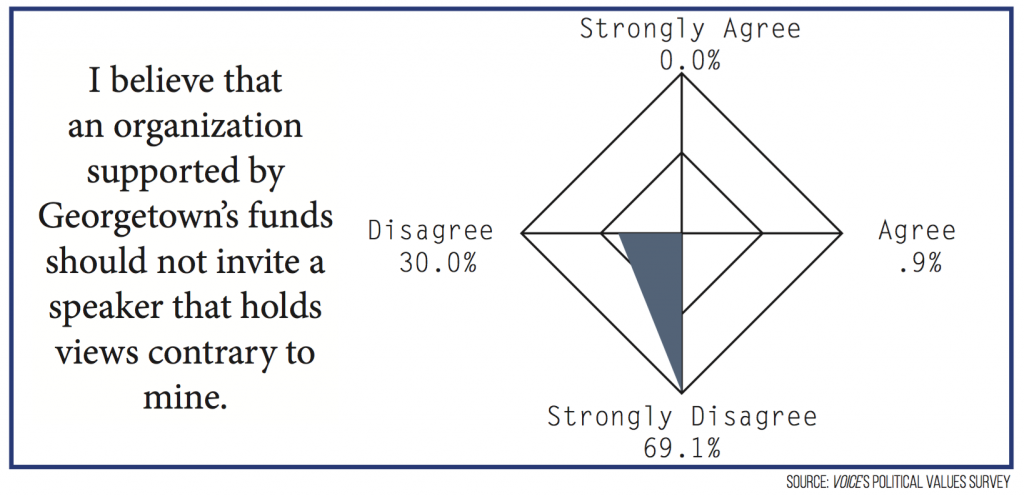 “I’ve never seen a problem with that at Georgetown,” he said. “I don’t think that anybody in class, liberal or conservative, really disputes that you may want to make people feel more comfortable…you want questions that might make people less nervous.”
“I’ve never seen a problem with that at Georgetown,” he said. “I don’t think that anybody in class, liberal or conservative, really disputes that you may want to make people feel more comfortable…you want questions that might make people less nervous.”
Despite this, Ladd admitted that he has found that the majority of students who have been the most outspoken and active outside of the classroom, in his experience, have been liberal. “There’s no way for me to really tell if there are other conservative students who are nervous about talking,” he said. He also said that he’s never had the experience of a student coming up to him and telling him that he or she was too nervous to speak up in class.
Professor Hans Noel of the Government department also commented on the political makeup of the student body. He explained that he conducts a survey in his class in which students can self-identify whether they are liberal or conservative. The results are generally varied, but he said that there are a number of students who identify themselves as extremely liberal, but almost no students who identify as extremely conservative. “You’ve got both sides, but there are a chunk of conservatives who are just not there,” he said.
On the other hand, Marcia Chatelain, a History Department professor who teaches courses on race relations in America, said that she used trigger warnings in class with success. “I’m sensitive to the needs of all of my students. I think that when you take great care in creating community and treating people with respect, difficult conversations are less scary because you’ve invested in building the trust that you need to really engage these classroom topics,” she said.
According to Dr. Chatelain, trigger warnings, can be a call for a deeper understanding of the relationship between student and teacher. She pointed to a specific example, because many of the courses she teaches involve racial violence, death, and destruction of people’s’ lives and communities as a result of racism.
“[Trigger warnings] doesn’t mean that students today are soft, or that they aren’t smart,” she said. “It means that as we evolve, we have a more sophisticated understanding of the needs of people and we want to meet people where they are.” She continued to say that trigger warnings challenge professors to figure out how to teach difficult material while making sure that students do not feel diminished by what they are discussing.
Dr. Chatelain mentioned that she teaches a book about sexual violence, At the Dark End of the Street: Black Women, Rape, and Resistance—A New History of the Civil Rights Movement from Rosa Parks to the Rise of Black Power, and that the book is very explicit about experiences that women had during the civil rights movement. She lets students know that they are about to read a book that contains several instances of sexual violence, as a sort of trigger warning, and that if they found anything disturbing or alarming, there are resources on campus to reach out to. “I’ve had students say that they appreciated me recognizing that this type of material can have an impact,” she said.
When conservative students appear to be a minority at college
The root causes of the growing prevalence of trigger warnings and safe spaces may lie in the political atmosphere of a college campus. In July, Athey published a widely-read post, “No Climate for Conservatives at Georgetown,” on The Right Way, the blog for the GUCR. Citing the backlash the GUCR received from inviting Sommers, she alleged that an environment on campus exists that discourages free expression.
“Liberal students at Georgetown University have created a toxic and hostile environment for conservatives,” she wrote in her article. “The attitudes expressed by militant, left-wing Hoyas are incredibly dangerous to a productive university atmosphere, one that is supposed to champion free speech and diversity of opinion.”
In an attempt to investigate the student exchange of political discourse, in September, the Voice conducted an unscientific survey about Georgetown students’ political values. Of the 320 anonymous responses the Voice collected, the vast majority of them agreed or strongly agreed with views supporting the funding of Planned Parenthood, the recent Casa Latina proposal at Georgetown, and a path to citizenship for undocumented immigrants. (See a breakdown of the survey’s results here.)
Additionally, in an effort to contextualize the results of the survey, the Voice reached out to many student groups on campus. Of those groups, the Black Leadership Forum, members of the Black House, and some members who participated in the Last Campaign for Academic Reform either declined or did not respond to requests for comment.
When asked about her blog post, Athey offered instances of when she felt targeted for her conservatism and her inability to make many friends when she lived on the second floor of New South during the 2012 presidential elections. “I just came home one day and there was a drawing of male genitalia, and excuse my language, it said, ‘I heart to suck Obama’s dick,’” she said. “I don’t doubt that I was being singled out for my views.”
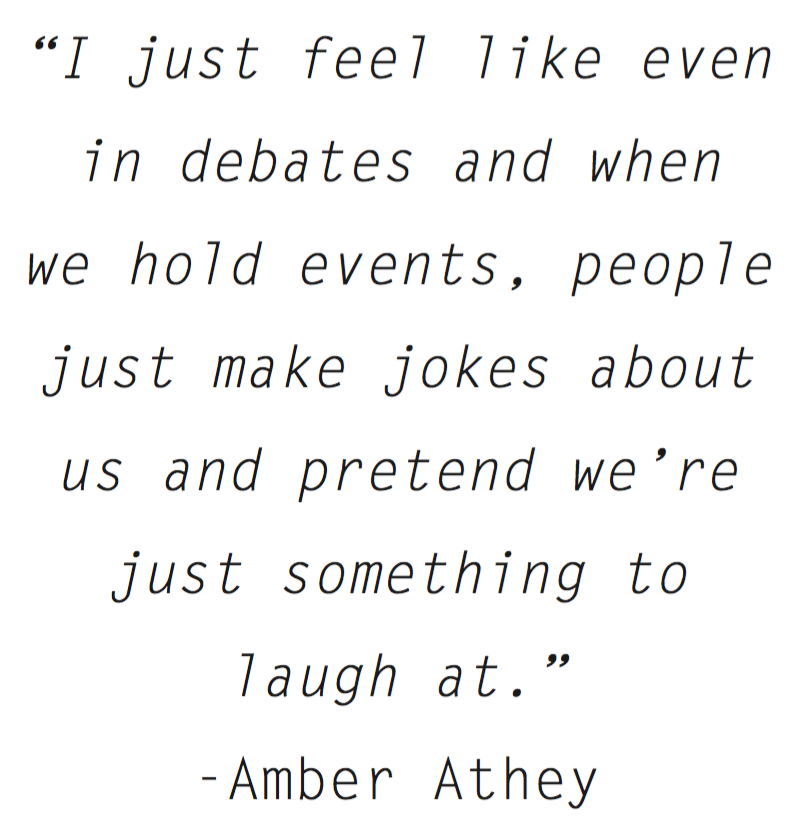 The incident did not affect her much, but she worries about freshmen who come in and fear that they could lose friends because of their conservative views. “That’s when it becomes a problem because you’re suppressing these people who are genuinely afraid of the consequences of being a Republican,” she said. “There isn’t a space for conservatives anymore. I just feel like even in debates and when we hold events, people just make jokes about us and pretend we’re just something to laugh at.”
The incident did not affect her much, but she worries about freshmen who come in and fear that they could lose friends because of their conservative views. “That’s when it becomes a problem because you’re suppressing these people who are genuinely afraid of the consequences of being a Republican,” she said. “There isn’t a space for conservatives anymore. I just feel like even in debates and when we hold events, people just make jokes about us and pretend we’re just something to laugh at.”
One explanation Athey offered for her treatment was that there is a pervasive stereotype of Republicans as consisting only of old, rich, and white males. Alex Robledo (COL ’17), who identifies as Republican, felt the same. “There are people from all walks of life that identify either way, and so it’s just unfortunate that Republicans, for whatever reasons, have this image clinging to them, that they’re just one way, when the truth is much more diverse than that,” he said. “My mom came from China. She came to this country with a suitcase and $2,000 in cash in hand—by no means rich, nevertheless conservative, [and she] identifies as Republican. Those people definitely exist. Same for Democrats.”
Gregory said that Athey had spoken with him about her feelings of being persecuted. Yet he believes that Georgetown remains a campus that does its very best to foster open dialogue. “If you want to be in this real world, you have to deal with the criticism,” he said. “And if you say something that people say is misogynistic here at Georgetown, if you go out into the real world and say that, people are going to say the same thing too. And if you don’t accept that, then you shouldn’t have a place in politics, because that’s the reality of the situation.”
He also challenged the generalizations in Athey’s claims that liberal students are responsible for aggressively stifling dialogue on Georgetown’s campus.
“When you’re talking about your friends, your fellows, your classmates, and say that they are all ‘hell-bent’ on oppressing conservatives, it seems to me like an extreme exaggeration and it just doesn’t seem … [like] something that you can really take that seriously,” he said.
Other groups that hold traditionally conservative views have felt marginalized as well. Khan spoke to the resistance they’ve encountered from students and the university. “A lot of our pushback comes from faculty themselves,” Khan said. “I don’t think that there’s a general atmosphere [on campus] that’s very willing to talk about these issues and give the other perspective. The whole point of a university is you come and you’re exposed to views that are contrary to your own.” Khan also said that Vita Saxa has heard chants containing lines such as, “Hey pro-lifers don’t lie, you don’t care if women die.”
Gabriella Munoz (COL ‘18), the vice-president of Vita Saxa, spoke about a specific example of a negative reaction from the student body. A pregnant woman was at the Vita Saxa table in Red Square, and Munoz said that she overheard students remarking on that fact. “[The student said] ‘Oh my gosh, they have a pregnant woman there,” Munoz said. “A lot of people see that if we have a kid at our table or somebody’s pregnant that it’s a marketing thing, but [they] really just happen to be there.”
“H*yas for Choice is able to distribute their condoms and contraceptives in dorms,” Khan said. “There are certainly people in the administration we work closely with and student health who are great and some Jesuits, but on a large scale there’s a total reluctance.”
As the leader of a pro-choice group at Georgetown, Kleyman said that her organization does not experience much resistance from the student body. “I feel like being pro-choice is not really a minority in and of itself, studies have shown that a majority of Americans are pro-choice, especially college-aged students,” she said.
However, Kleyman also said that as a group unrecognized by the university, H*yas for Choice faces logistical challenges in their work. Last year, they gained the ability to access storage space, to reserve classrooms, and to use printing services due to a partnership with the Georgetown University Student Association.
“The biggest challenges we see…a lot of the suppression that we face comes from that status, as unrecognized,” she said. “Where we’re allowed to table, where we’re allowed to hand stuff out, things like scheduling events is always really hard for us. Getting rooms reserved is always a difficult process because we can’t go through the normal means that access-to-benefits groups can.”

The meaning of social justice in political discourse
In the past year, Georgetown’s campus has confronted itself with issues of race and identity. Students have traveled to Ferguson, Mo. in the wake of Michael Brown’s death, staged a die-in at the annual Christmas tree lighting in Dahlgren Quad, fought for the creation of the university to provide a Casa Latina, and supported a proposal for a diversity course requirement, which the Main Campus Executive Faculty passed in April.
As some students have devoted themselves to campaigns for change on campus, others have expressed concerns about the tactics they have been using. The term ‘social justice warrior’ has surfaced to describe people who promote socially progressive views.
GUSA’s Vice-President Connor Rohan (COL ’16) said that he has experienced stressful times when he did not find it easy to work with social justice advocates. [Full disclosure: Rohan is a former Voice staffer.]
“A social justice warrior is someone who takes social justice and ostensibly strives to be open, but in doing so is extremely closed-minded, someone who is overzealous to the point where there is no dialogue, there is no compromise. There is just forceful ideology,” he said.
During his administration, Rohan, with GUSA President Joe Luther, has addressed issues ranging from endorsing the diversity course requirement proposal to working with university administrators on a memorandum of understanding for reforming sexual assault and medical leave of absence policies. From his experiences, he says that there is a culture of anger born from the injustices that these activists are attempting to address, which sometimes makes having a dialogue with them difficult. Rohan admitted to being uncomfortable speaking about the tactics students who wanted change used throughout his interview with the Voice.
“The discomfort I’m feeling [in this interview] is a fear of retribution. It’s because if I don’t have the right vocabulary, if I don’t have the right ideology, and if I don’t fall into the campus social media dialogue perfectly, there is always criticism and usually not constructive criticism,” he said. “It’s like The Tea Party of the Left, in that it’s my way or the highway.”
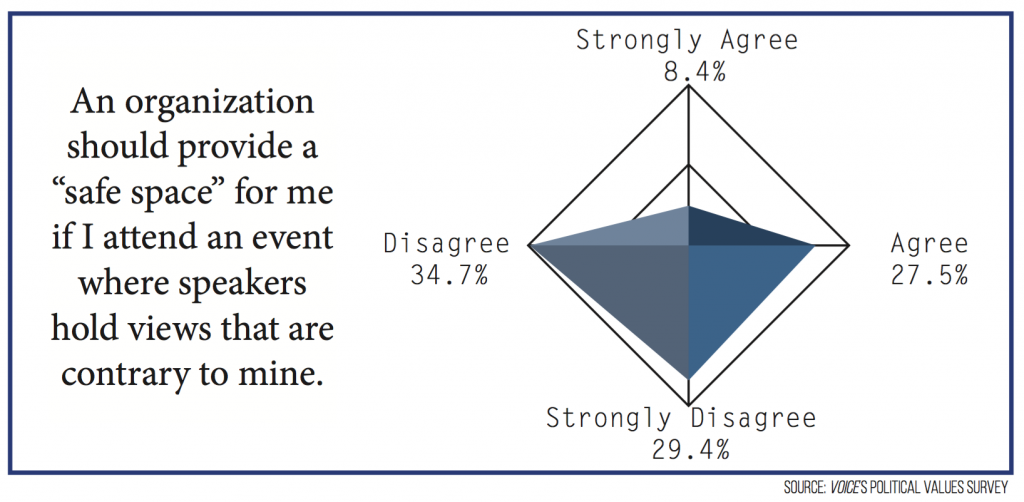 On the other hand, Vincent DeLaurentis (SFS ’17), a member of the Georgetown Solidarity Committee and an organizing coordinator for H*yas for Choice, does not view the term “social justice warrior” as a derogatory one. “We are doing battle. These systems are killing people everyday, these systems are actively working to oppress us and to stop us from doing this type of work,” he said.
On the other hand, Vincent DeLaurentis (SFS ’17), a member of the Georgetown Solidarity Committee and an organizing coordinator for H*yas for Choice, does not view the term “social justice warrior” as a derogatory one. “We are doing battle. These systems are killing people everyday, these systems are actively working to oppress us and to stop us from doing this type of work,” he said.
He added that that Georgetown’s student body has a difficult time accepting the need for confrontation and argument as legitimate tactics for political organizing work.
“Students are so concerned with this pre-professional culture and this faux-discourse of respect and mutual exchange,” he said. “The dominant system relies on conformity, it relies on quietness, it relies on maintenance of the status quo. For the majority of people who are not facing pretty explicit violence in their daily lives, it’s pretty hard to understand that there’s violence going on around us and violence happening in all of our interactions.”
Patrick Musgrave (COL ‘16), a former chair of the GUCR, disagreed with this concept of violence. “I frankly don’t go for that sort of language, saying that interpersonal interactions get violent. They get violent when somebody hits somebody,” he said. “[The word is] co-opted not for its meaning, but for its shock value.”
Musgrave explained that such sentiments made it difficult to have conversations about sensitive topics. When he chaired the Student Activities Commission (SAC), he was initially not in support of a black pre-law society because he thought that a group should help all students, no matter who they were, enter law school. While he later understood the merits of having a black pre-law society, which has since prospered as a SAC group, he said that he had no racial motivation, and did not like being called a racist for those thoughts.
“I think too many people take skepticism as an insult,” he said. He believes that Georgetown’s students needed to separate emotion from political discourse.
For Josue Coronado (COL ’18), the Latinx Leadership Forum’s media chair, it’s impossible to separate emotions from the Casa Latina proposal that he and other students have been advocating for. “You feel emotions, because you have lived it, you’ve transferred into this fight for a house, a space for inclusivity on campus … These are issues that we feel and because we feel them then they are true,” he said.
Having grown up in Hiram Clarke, a low-income community in Houston, Texas, Coronado said that as a Latino student, he lives and faces a systemic ignorance of the Latinx experience everyday at Georgetown. He recalled a difficult experience from his macroeconomics class. “The professor was trying to make an example, he was like, ‘Imagine if you were poor.’ A couple of my friends next to me were like, ‘Yeah, imagine, right,’” he said.
A particularly upsetting time was when the same professor and some of the other students laughed at Mexico’s murder rates when they were comparing different countries around the world. “That really angered me because other people’s misery shouldn’t be something we laugh at,” he said.
Coronado dismissed perceptions that people who fight for social justice are too sensitive or too politically correct. “If you are upholding ignorant or bigoted beliefs, in essence, if they do hurt other people, then that’s wrong and we should be to call you out on that,” he said.
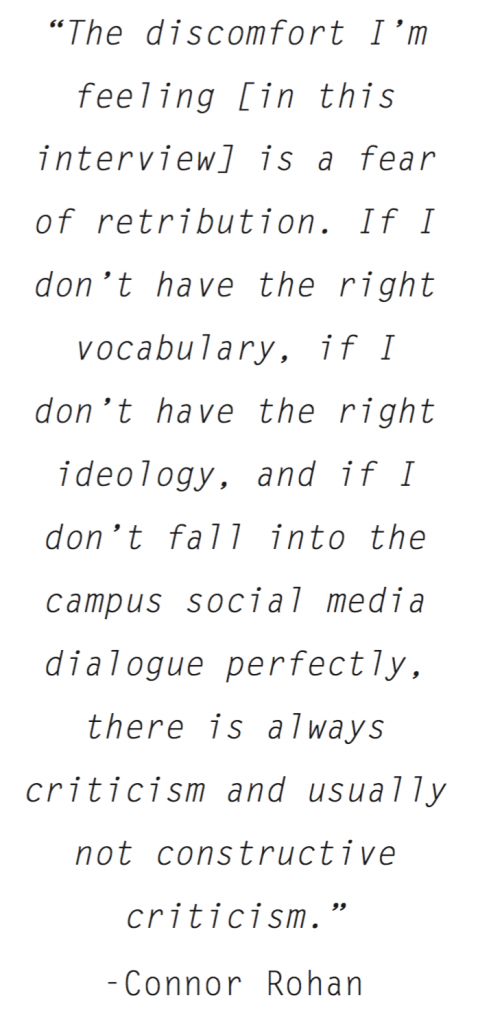 Echoing Coronado’s views, Gregory said that in this day and age, it is common sense for someone to not be homophobic, racist, or sexist in their speech or writing. “These old age characterizations of folks as whatever stereotype you want to pick out—they’re wrong,” he said. “If someone goes out there and says something bad about Jews, or blacks, or gay people, and it’s so obvious, then, yeah, there should be a backlash, because as informed citizens of the 21st century who attend a great university or in one of the cities of the world, yes, we should be enlightened. We should be informed.”
Echoing Coronado’s views, Gregory said that in this day and age, it is common sense for someone to not be homophobic, racist, or sexist in their speech or writing. “These old age characterizations of folks as whatever stereotype you want to pick out—they’re wrong,” he said. “If someone goes out there and says something bad about Jews, or blacks, or gay people, and it’s so obvious, then, yeah, there should be a backlash, because as informed citizens of the 21st century who attend a great university or in one of the cities of the world, yes, we should be enlightened. We should be informed.”
DeLaurentis thought that it was impossible to equate the discomfort that his political work generates to feelings of oppression. “Oppression looks like you being poor, it looks like you being killed by the police, it looks like you being denied reproductive healthcare. Oppression doesn’t look like you getting upset because I yelled something at you,” he said.
To productively engage with someone who holds an opposite opinion, Musgrave said that students needed to conduct themselves with dignity when expressing their views.
“We would love it if, say, H*yas for Choice, instead of holding up these vile signs outside of the Cardinal O’Connor Conference on Life, we would like if if they would come in, go to the breakout sessions, and then ask tough questions [to] our speakers,” he said. “Ultimately, on a college campus, you get attention by conducting yourself with dignity and not yelling and screaming and doing these slogans and stuff.”
Musgrave acknowledged that college is a place where your views are challenged. He arrived at Georgetown as an ardent supporter of the death penalty. After engaging in discussions with the death penalty with the Catholic community, he said, “I’ve seen that if you’re going to be pro-life, you have to be pro-life all the way.”
Gregory, too, believes in open expression and criticism as a part of the learning experience. He spent the summer working at the Embassy of Israel in Van Ness for a government that opposed Obama’s Iran deal. Although he personally supported the deal, he still enjoyed his internship. “If you go through college hearing only what you want to hear, you’re not going to learn from anything. You’re going to emerge from college unprepared for the real world, where you’re bound to encounter people who disagree with you,” he said.
For Coronado, inviting people to understand others who come from different socioeconomic and cultural backgrounds is key to being women and men for others. He wishes that society had a better view of the work that social justice activists believe they are carrying out.
“I think we should all be activists. I think we should fight for equality, fight for something that is owed to people, out of the simple fact that we’re all human,” he said.
Interested in learning about the results of Voice‘s political values survey? Click here!
Graphics by Johnny Jung and Vance Vaughan.
This article was originally published in the Oct. 23, 2015 issue.


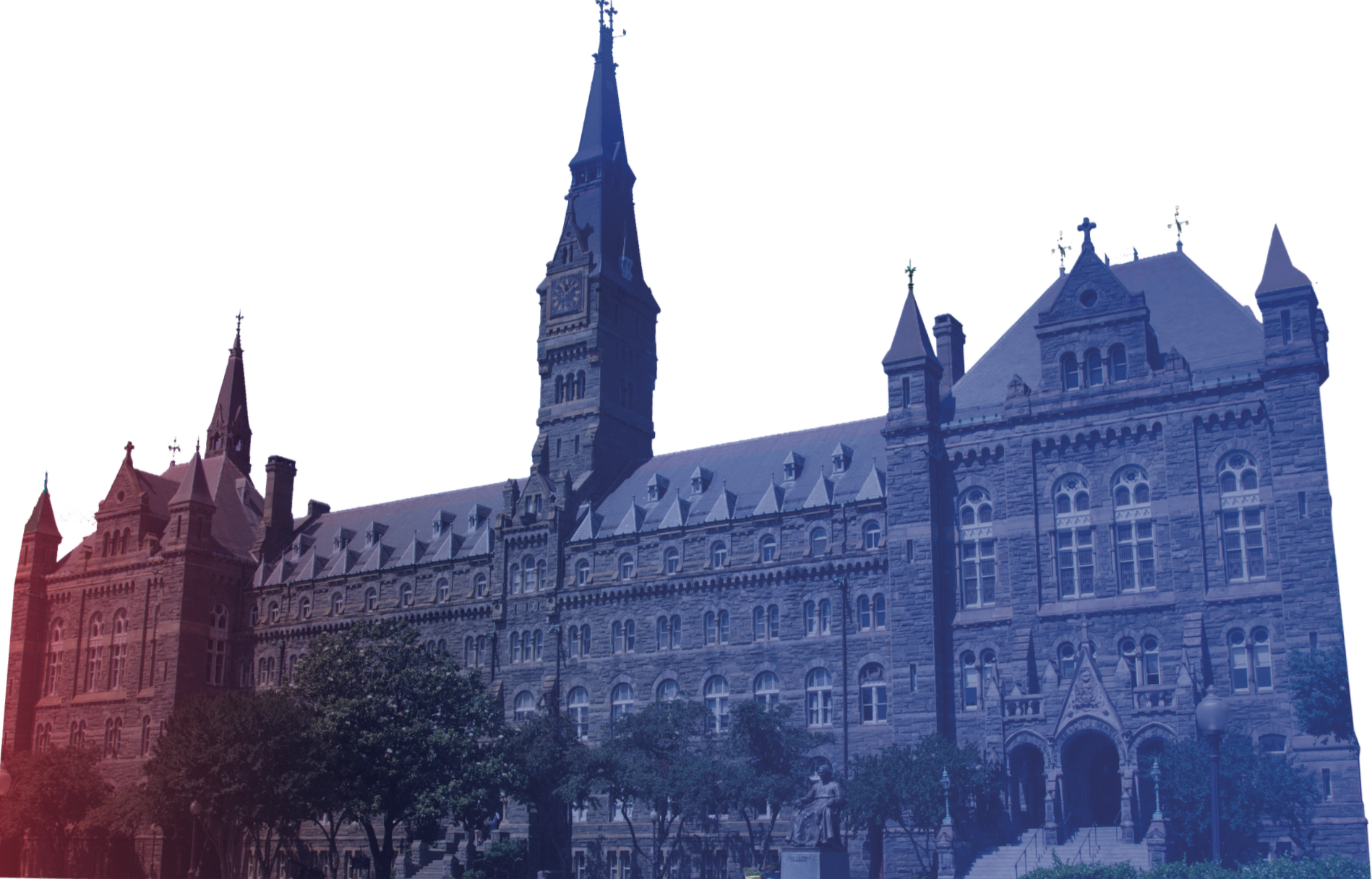



This is an excellent piece of journalism which should be submitted for an award somewhere. Both authors could drop out of Georgetown right now and flourish as professional journalists. Bravo!
Michaela Pepi-Lewis (COL ‘18), the vice-president of H*yas for Choice, said. “We did feel the need to make a note that we did not agree with the message that was being presented.”
Why? They weren’t hosting the event. GUCR doesn’t make a note every time GUCD brings a speaker they disagree with.